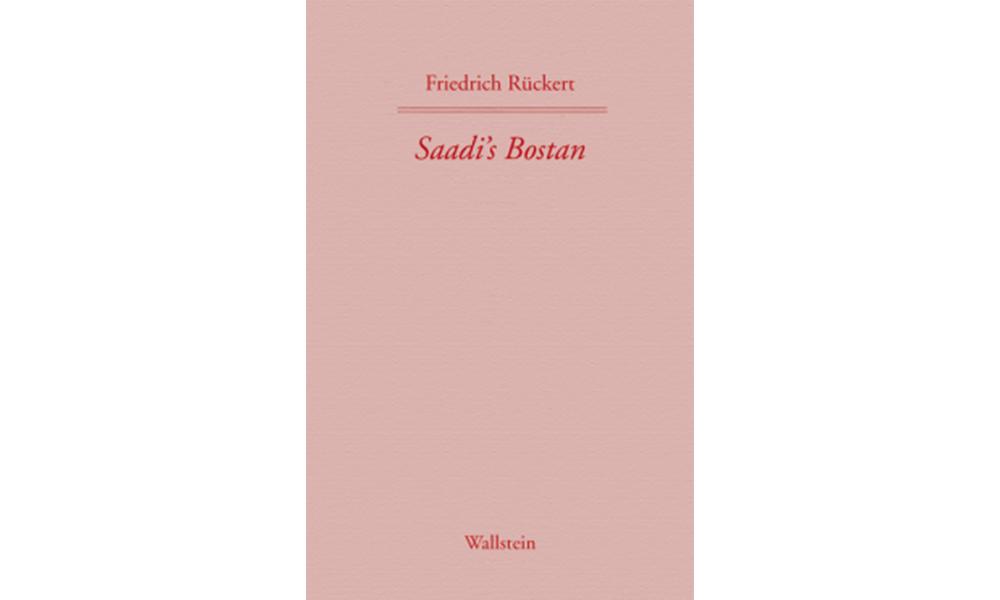Saadi’s Bostan, translated from Persian to German by Friedrich Rückert, has been published in a new edition by Wallstein Verlag. This translation, which is also known as “Duftgarten,” is one of the most beloved Persian works of literature and has been popular in Iran for centuries.
The Bostan (Būstān) is a moralistic and anecdotal poem consisting of over 4,100 masnavi couplets by the Persian poet Shaikh Moṣleḥ-al-Dīn Saadī. Completed in 655/1257, the work is dedicated to Saadi’s patron at the time, the Salghurid atābak of Fārs, Abū Bakr b. Saad b. Zangī, and is divided into ten chapters covering topics such as justice, beneficence, love, humility, acceptance, contentment, and close communion with God. While the Bostan is often compared to Saadī’s more popular prose-and-verse work, the Golestān, it is considered to be of a more serious purpose and tone. Saadī’s writing style in the Bostan is contemplative, rhapsodic, and exhortatory, rather than closely reasoned in a philosophical sense. The work contains passages of particular frankness, even of courage, and is known for its originality and immediacy, as Saadi brings readers intimately into his world.
Friedrich Rückert was a German poet, translator, and professor of Oriental languages. He was born in Schweinfurt in 1788 and studied at the universities of Würzburg and Heidelberg. Rückert’s literary career began in 1814, during Germany’s struggle with Napoleon, and his works include “German Poems”, “Eastern Roses”, and “The Wreath of Time”. Rückert was a master of thirty languages and made his mark as a translator of Oriental poetry and a writer of poems in the spirit of Oriental masters. He died in 1866 in Neuses and continues to exert a strong influence on Oriental studies in Germany. Rückert’s poetry was set to music by numerous composers, including Schubert, Brahms, and Mahler.
Friedrich Rückert is widely regarded as the most gifted poet and versifier in German literature. He is particularly known for his translations of Oriental poetry, which are praised for their musicality and attempt to capture the nuances of the original works. Rückert’s translations and adaptations are notable for their use of varying stress patterns and intricate rhyme schemes, which are not typical in German poetry. Although some modern readers may find his works challenging to understand, those familiar with Oriental poetry appreciate the beauty of Rückert’s translations and consider them to be faithful to the originals in terms of their melodic quality. He was able to capture the rhythm and meter of the original poems while still making them accessible to German readers. Friedrich Rückert’s translation of Saadi’s Boostan into German is a work of great beauty and persuasion. In it, Rückert has managed to capture the essence of Saadi’s Persian classic and render it into an accessible and moving work for a German audience. Rückert’s Boostan is not simply a translation of the Persian original, but rather a new work in its own right.
While European “Mirror for Princes” (Latin: specula principum) texts of the Middle Ages focused on the virtues and duties of rulers, the Bostan provides guidelines for all responsible individuals. Rückert was drawn to the combination of aesthetics and ethics in the work and translated it in 1849-1850. The first edition was published posthumously in 1882.
The new edition, which includes the complete text based on manuscripts, has been edited by Jörn Steinberg, Jalal Rostami Gooran, Annemarie Schimmel, and Peter-Arnold Mumm. Rückert’s annotations to his translation are also included, and the editorial report provides a comprehensive history of the work’s creation and sources.
Overall, this edition of Saadi’s Bostan is a valuable addition to the scholarship on Persian literature and a fitting tribute to the life and work of Friedrich Rückert.
Saadi’s Bostan. Aus dem Persischen übersetzt von Friedrich Rückert
[Saadi’s Bostan. Translated from Persian by Friedrich Rückert]
WERKE DER JAHRE 1850-1851. ZWEITER BAND
[WORKS OF THE YEARS 1850-1851. SECOND VOLUME]
Bearbeitet von Jörn Steinberg, Jalal Rostami Gooran, Annemarie Schimmel und Peter-Arnold Mumm
[Edited by Jörn Steinberg, Jalal Rostami Gooran, Annemarie Schimmel and Peter-Arnold Mumm]
Reihe: Friedrich Rückerts Werke. Historisch-kritische Ausgabe / »Schweinfurter Edition«
[Series: Friedrich Rückert’s works. Historical-critical edition / »Schweinfurt Edition«]
472 S., Leinen, Lesebändchen, im Schuber, 12 x 19 cm
[472 p., linen, ribbon bookmark, in slipcase, 12 x 19 cm]
ISBN 978-3-8353-0495-6 (September 2013)
Davood Khazaie (PhD), Literary Art Critic
Links and Sources:
G. Michael Wickens, “Būstān”, Encyclopædia Iranica, Vol. IV, Fasc. 6, pp. 573-574; available online at: Būstān (accessed online at 10 May 2023).



